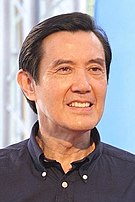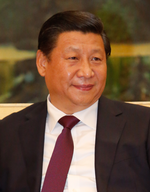Ma–Xi meeting
The 2015 Ma–Xi Meeting (simplified Chinese: 马习会; traditional Chinese: 馬習會; pinyin: Mǎ Xí Huì) also known as the Xi–Ma Meeting (simplified Chinese: 习马会; traditional Chinese: 習馬會; pinyin: Xí Mǎ Huì) is a proposed meeting between the leader of the People's Republic of China (PRC) Xi Jinping and leader of the Republic of China (ROC) Ma Ying-jeou. Details of the meeting were leaked by Taiwanese newspaper Liberty Times on 3 November 2015 and details were officially confirmed over the following days; it is scheduled to take place at Shangri-La Hotel in Singapore on 7 November.[1] The meeting would be the first between the leader of the Republic of China (Taiwan) and the People's Republic of China (Mainland China) since the end of the Chinese Civil War (Chinese Communist Revolution) in 1949.[2]
Background
The original idea of the meeting was from the Ma Ying-jeou administration of Taiwan. The one on November 7 was proposed by Taiwan Affairs Office (TAO) Director Zhang Zhijun during cross-strait talk with Mainland Affairs Council (MAC) Minister Andrew Hsia in Guangzhou, China in October 2015.[3] Initially, Minister Hsia proposed the meeting to take place during the APEC Philippines 2015 in Manila, the Philippines. However, Zhang found it to be unsuitable. Later Hsia suggested the meeting to take place in Singapore, the place where the Wang-Koo summit was held on 27–29 April 1993, the first cross-strait negotiation after the so-called 1992 Consensus a year earlier in British Hong Kong.
Preparation
Due to the political dispute between the two governments, both officials have agreed for ROC leader and PRC leader (Chinese: 两岸领导人) to address each other as "mister" and that both will participate within their capacity as Leader of Taiwan and Leader of Mainland China respectively.
The ROC Presidential Office stated that the intention of President Ma for this meeting is to consolidate peace and maintain the status quo. President Ma will be joined by Presidential Office Secretary-General Tseng Yung-chuan and Deputy Secretary-General Hsiao Hsu-tsen (蕭旭岑), National Security Council Secretary-General Kao Hua-chu and advisor Chiu Kun-Shuan, MAC Minister Andrew Hsia and Deputy Minister Wu Mei-hung.[4]
Meeting chronology
On 5 November 2015, Communist Party of China (CPC) General Secretary and President Xi departed from Beijing to Vietnam as his first state visit to the nation at the invitation of Communist Party of Vietnam General Secretary Nguyễn Phú Trọng and President Trương Tấn Sang.[5]
Reactions
Republic of China/Taiwan



During an international news conference prior to the meeting, President Ma said that two sides of the Taiwan Strait should continue to mitigate their animosity, avoid deviating from the right path and expand exchanges and cooperation. He mentioned that the meeting is not for his legacy before he step down in 2016 as President or for improving the popularity of KMT, but for the good of the next generation.[6] Foreign Minister David Lin said that Ma-Xi meeting will focus on cross-strait peace and stability. The government will make sure that the meeting will not involve any political negotiations and will not lead to any downgrading of Taiwan's status. It will be held under the principle of equality and dignity with proper courtesy.[7]
The Kuomintang described the meeting as a "milestone" in Cross-Strait relations.[8]
Presidential candidate and incumbent chairwoman of the Democratic Progressive Party (DPP) Tsai Ing-wen called the proposed meeting a manipulation of the January elections and labeled the decision-making process as opaque. She added that the meeting has triggered questions and doubts from the public because people have lost confidence in the government when it comes to cross-strait exchanges.[9]
The youth division of the Taiwan Solidarity Union, the currently third largest political party in Taiwan, also threw colored smoke bombs over the cordons surrounding the Presidential Office Building.[10]
Third-force party leaders oppose the meeting. New Power Party (NPP) Chairman Dr. Huang Kuo-chang accused Ma of attempting to burnish his legacy at the expense of changing the direction of national security policy, and trampling on Taiwan’s democracy and sovereignty by bypassing the Congress. He argued that Ma's trip would violate his 2011 promises in which Ma said that he would not meet with Chinese leaders if re-elected. Social Democratic Party Chairman Dr. Fan Yun said “Ma doesn’t have any mandate for surprising us with this meeting — ever since last year’s Sunflower Movement, it has been clear that the handling of cross-strait relations by the governing party is not trusted by the people.” Green Party Taiwan co-convener Lee Ken-cheng added it was not clear whether Ma had made concessions to arrange the meeting. And a meeting about 70 days before the Presidential and Congressional elections, it is obvious that China wants to use this to interfere with Taiwan’s elections.”[10]
The Chinese National Federation of Industries, Taipei Chamber of Commerce, and Allied Association for Science Park Industries, all of which are Taiwanese business organizations, expressed support for the upcoming meeting, which is expected to help improve Taiwan's economic prospects.[11]
People's Republic of China
TAO Director Zhang Zhijun said that the scheduled meeting between the two sides is a milestone in cross-strait relations, would help enhance trust across the Taiwan Strait and consolidate common political background, and the meeting would also push forward peaceful development of cross-strait relations and safeguard peace and stability in the region.[12]
Singapore
The Ministry of Foreign Affairs said that the meeting is a milestone in the history of cross-Taiwan-strait relations and that Singapore is happy to facilitate and be the venue for the direct dialogue between the two sides, noting Singapore's close and longstanding friend for both Taiwan and Mainland China.[13]
United States
United States State Department spokesperson Elizabeth Trudeau stated that the U.S. expected "constructive dialogue" to occur,[14] though no statements or agreements are expected to be announced upon the conclusion of the meeting.[2] China expert and former National Security Council member Evan Medeiros credited the warming of relations that led to the proposed meeting to US President Barack Obama's "pivot to Asia."[15]
See also
References
- ^ "Ma, Xi to split dinner bill in Singapore". focustaiwan.tw.
- ^ a b Lee, Shu-hua; Chang, S.C. "President Ma to meet China's Xi in Singapore Saturday (update)". Central News Agency. Retrieved 4 November 2015.
- ^ http://taiwantoday.tw/ct.asp?xItem=237280&ctNode=2175
- ^ http://www.chinapost.com.tw/taiwan/national/national-news/2015/11/05/450151/Details-emerge.htm
- ^ Zhang Jingya. "Xi Jinping leaves Beijing for state visit - CCTV News - CCTV.com English". cntv.cn.
- ^ "Ma hopes both sides will continue to cut animosity, deepen exchanges". focustaiwan.tw.
- ^ "Ma-Xi talks to focus on cross-strait peace: MOFA". focustaiwan.tw.
- ^ Hsieh, C. C.; Lee, Hsin-Yin. "Ma-Xi meeting 'milestone' in cross-strait relations: KMT". Central News Agency. Retrieved 4 November 2015.
- ^ Tsai sees 'manipulation' in play
- ^ a b Third-force parties rally against Ma-Xi meeting, Taipei Times, 2015/11/5
- ^ Lin, Meng-ju; Chang, Jackson; Huang, Frances (4 November 2015). "Business groups perceive Ma-Xi meeting positive for cross-strait ties". Central News Agency. Retrieved 4 November 2015.
- ^ Zhang Jingya. "Meeting signals new high in cross-Strait ties - CCTV News - CCTV.com English". cntv.cn.
- ^ Andrea Tan (4 November 2015). "Singapore's Lee Brings Chinese Renegade, Big Brother Xi Together". Bloomberg.com.
- ^ Chang, Ria; Wu, Jeffrey (4 November 2015). "U.S. encourages 'constructive dialogue' ahead of Ma-Xi meeting". Central News Agency. Retrieved 4 November 2015.
- ^ Cheng, Rita; Hsu, Elizabeth (4 November 2015). "Ma-Xi meeting should be applauded: ex-White House official". Central News Agency. Retrieved 4 November 2015.



